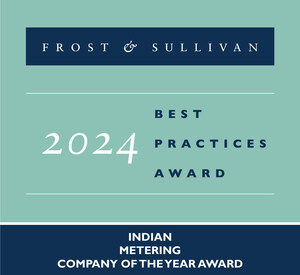Automotive Electronics Market Set to Advance in India with CASE Convergence, E-Mobility, Among Others
The increasing use of automotive electronics in various vehicular applications is contributing to rapid growth
SAN ANTONIO, April 4, 2022 /PRNewswire/ -- Frost & Sullivan's recent analysis, Indian Automotive Electronics Growth Opportunities, finds that continuous innovation and development in the automotive industry is boosting the demand for automotive electronics. Its increasing use in various vehicular applications, such as active and passive safety, infotainment, body electronics, and advanced driver assistance systems, contributes to its rapid market expansion worldwide, including in India. Short- and medium-term technologies, sensors and actuators in the Indian automotive electronics market will likely unlock opportunities worth $9,214.7 million for suppliers by 2025.
For further information on this analysis, please visit: https://frost.ly/763.
"The current automotive industry trends toward connected, autonomous, shared, and electric (CASE) convergence have automotive electronics as the primary enabler," said Deexeta Mohan Kumar, Research Analyst, Mobility Practice, Frost & Sullivan. "Additionally, Mega Trends such as e-mobility, e-retail, and service marketplaces will further influence automotive electronics and the aftermarket."
Kumar added: "Government norms on emissions and the shift toward electric vehicles (EVs) propel requirements for automotive electronics components. Further, regulating active safety features like dual airbags, electronic stability control (ESC), and tire pressure monitoring systems (TPMS) will boost India's demand for automotive electronics."
India's EV market is still nascent and is forecast to record a 2.4% CAGR from 2020 to 2025. Electrification is expected to penetrate cars and last-mile connectivity modes like two-wheelers in India by 2030. Frost & Sullivan expects about 70% of two-wheeler fleets and 30% of private two-wheelers to be electric by 2030. For passenger vehicles, 40% of fleets and 15%-20% of private cars will be electric by that time.
To tap into the growth prospects in automotive electronics in India, market participants should:
- Leverage the electrification transition trend: The Indian EV segment is untapped and has immense growth potential. Automotive electronics manufacturers should strategize their investments and align efforts toward growing their market presence.
- Educate customers: Original equipment manufacturers (OEMs) should communicate the benefits of deploying automotive electronics, such as cost-efficiency, long-term return on investment, and driver and passenger safety.
- Incorporate health, wellness and well-being (HWW): Frost & Sullivan anticipates the need for innovation and product differentiation to push automakers to tie up with multiple stakeholders across industries to offer increased healthcare and wellness systems for drivers and passengers. Industry stakeholders should provide the HWW features through partnerships with healthcare providers and make them available to customers.
Indian Automotive Electronics Growth Opportunities is the latest addition to Frost & Sullivan's Mobility research and analyses available through the Frost & Sullivan Leadership Council, which helps organizations identify a continuous flow of growth opportunities to succeed in an unpredictable future.
About Frost & Sullivan
For over six decades, Frost & Sullivan has helped build sustainable growth strategies for Fortune 1000 companies, governments, and investors. We apply actionable insights to navigate economic changes, identify disruptive technologies, and formulate new business models to create a stream of innovative growth opportunities that drive future success. Contact us: Start the discussion.
Indian Automotive Electronics Growth Opportunities
PC0E-46
Media Contact:
Priya George, Corporate Communications
P: +91 44 6681 4414
E: [email protected]
SOURCE Frost & Sullivan

WANT YOUR COMPANY'S NEWS FEATURED ON PRNEWSWIRE.COM?
Newsrooms &
Influencers
Digital Media
Outlets
Journalists
Opted In






Share this article